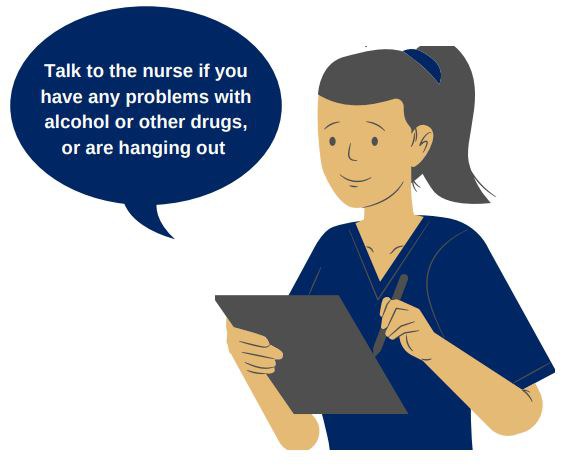Information and education
Justice Health NSW employs specialist nurses and doctors to provide treatment for patients in custody with drug and alcohol problems.
If you would like more information about your drug and/or alcohol use or treatments, speak with a nurse who can refer you to a specialist drug and alcohol nurse or doctor.

Assessment
Everyone entering a correctional centre will have a health assessment.
This includes a review of any drug and alcohol problems. If you are at risk of going into withdrawal from alcohol or other drugs, the nurse will make sure you get treatment.
If you are on methadone or depot buprenorphine, the nurse will make sure you continue to get it while you are in custody (if appropriate).
Harm minimisation
If someone is intoxicated (stoned or drunk), they should be seen by a nurse or doctor, and can get treatment to make them and other people safe.
If someone is “smashed”, get help for them as soon as possible. The drug and alcohol nurse can talk with you about safer ways of using to help stop you overdosing or getting hepatitis C and HIV.
Management of withdrawal symptoms
People in withdrawal (hanging out) should be seen by a nurse or doctor and can get medications to help them feel better. It is important that you tell them about how much you have been drinking/using and when you last had anything.
There will be follow up reviews if you are in withdrawal or at risk of going into withdrawal.
Opioid Agonist Treatment (OAT) or methadone programs
- It used to be called OST, it's the same program, just the language has changed.
- People who come into gaol on an OAT program such as methadone or depot buprenorphine will keep getting it in gaol unless there is a medical reason you shouldn’t.
- If you have questions or want to change your dose, or if you think you need to be on treatment, speak with a nurse.
- A nurse can refer you to a specialist drug and alcohol nurse or doctor.
Drug Court Program
This is a court diversion program for men and women. It usually takes a minimum of 12 months to complete. People starting the Drug Court program get assessed in gaol and can start treatment before they get out. If you are interested in this program, speak with your lawyer.
Compulsory Drug Treatment Program (CDTP)
- This is a court-ordered program, which is like a rehab for men with drug problems who keep coming back to gaol.
- You must have at least an 18 month non-parole period to do this program.
- This program is run in a separate gaol next to Parklea gaol. There are three stages in this program. The first stage goes for at least six months. The second stage has works release, and in the third stage of the program, you live in the community under the supervision of Corrective Services NSW (parole).
- Justice Health NSW looks after your health while you are in gaol, and helps arrange treatment in the community when you go to stage three.
Connections Program
- The Connections Program helps adult men and women with drug problems who are getting out.
- A Connections Transition Coordinator will see you before you are released, and do a care plan to work out what help you need when you get out.
- They will see you when you get out, too. Ask a nurse for more information or to refer you to the Connections Program.
Post-release health care
Justice Health NSW arranges treatment in the community for adults on OAT programs, such as methadone or depot buprenorphine who are being released from gaol. If you are getting out, or think you will be getting out on bail or parole, speak with a nurse at least four weeks before you are due for release, where possible. A nurse will organise for you to get your treatment when you get out.
Intensive Drug and Alcohol Treatment Program (IDATP)
This is a Corrective Services NSW group program which takes 10 months to finish. Men must be sentenced to be referred; women don’t have to be sentenced. The male and female programs are at Windsor (Geoffrey Pearce and Dillwynia Correctional Centres). Referral to the program can be made by Justice Health NSW or Corrective Services NSW staff.
Drug and alcohol counselling, group programs and rehab
Corrective Services NSW employs drug and alcohol counsellors. If you would like counselling, group programs or referral to a rehab, fill in a self-referral form (bluey) that you can get from the wing officer.
Expectations and feedback
All patients in custody should expect to receive health care with care and respect, without bias or discrimination, and recognising personal dignity at all times.
You are also expected to behave politely towards staff and others. If you are on methadone or depot buprenorphine, you will need to sign a treatment agreement. If you behave in a threatening or abusive way, your position on the program will be reviewed and you may be taken off.
If you have a health problem that you don’t think is being sorted out, ask to speak with the Nursing Unit Manager at your centre. If your problem is unresolved, you can call Justice Health NSW's Patient Health Enquiry Line (option 5 from the yard phone). If still unresolved, you can write to Justice Health NSW's Chief Executive. Health staff in your centre can give you the address. You can also ring the Corrective Services NSW Support Line (option 2 from the yard phone), who will pass it on to relevant Justice Health NSW staff.

